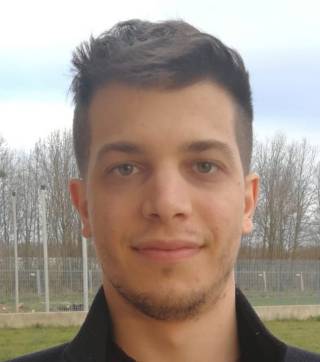Davide completed his PhD in 2021 with Prof. Benjamin Joachimi.

What was your PhD experience like at UCL?
It was my first experience studying and working abroad, and in hindsight I could not ask for a better one. Despite some pandemic in between, I never stopped feeling like I had the support of my supervisors, my colleagues and the entire department; I can summarise it by simply saying "I learnt a lot". Being part of the newly formed Centre for Doctoral Training in Data Intensive Science made it even more engaging, given its interdisciplinary focus.
Please describe (what was) your research area.
I worked on the application of machine learning algorithms to generate simulations of our Universe. This means that I had to jump from state-of-the-art techniques from the field of computer science to very very very large simulations that describe how everything we know started and evolved.
Describe the Astrophysics group in three words?
Welcoming, international and smart.
Your most memorable moment whilst doing your PhD?
If I have to choose, I had the chance to be in the same room as Sir David Attenborough, who visited the Cosmoparticle Hub during the opening ceremony of the Kathleen Lonsdale Building in 2018. Definitely an inspiring sight!
Where are you working now?
I am currently a postdoctoral fellow at the University of Geneva (Switzerland). I will be part of the Department of Theoretical Physics until September, and after that I will join the Department of Computer Science. Quite a jump!
What attracted you to the job?
I needed to get closer to Italy for personal reasons, and I wanted to pursue an academic career at the same time. Geneva really is an international city with lots of opportunities - and if you speak some French, it is even easier. Yes, I am learning French now.
How has your Astrophysics PhD helped you in your line of work?
The experience I got during my PhD in cosmology, statistics and machine learning is essential to do research in the field I am currently working in, and to teach these subjects to younger minds. But on top of all this, a PhD in Astrophysics will give you a problem-solving attitude that is definitely going to be useful in many other jobs (and in life as well?).
What do you aim to be doing in 5 years' time?
I hope I will be able to secure a fellowship or, even better, a lectureship to work as an academic, doing both research and teaching. But, as we all know, the competition is very fierce, so I always keep my mind open to alternative career paths, like setting up my own farm, perhaps with a restaurant too?
Any advice for budding scientists?
Your work as a researcher will go through highs and lows - it is the norm. Remember that unsuccessful projects are part of a scientist's life, together with null results and unexpected findings. Do not despair and try to incorporate this uncertainty into your mindset. It is not your fault!Oh, and, talk to your mentors and peers whenever you get a chance.
 Close
Close

